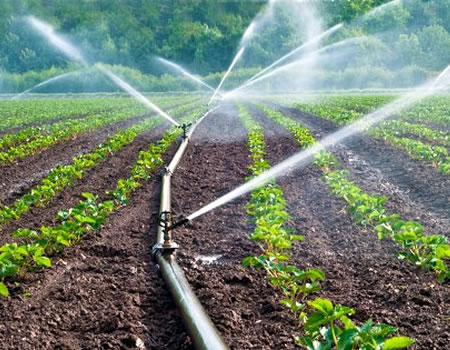
In order to guard against food shortages and boost food production in South-West Nigeria, stakeholders in the Nigerian agricultural sector have suggested ways farmers in the region can make judicious use of low-cost irrigation farming for optimal results.
Over the years, irrigation farming has been a difficult task for farmers in South-West Nigeria as a good number of them stated that it is capital intensive.

In separate interviews with the Nigerian Tribune, experts expressed divergent views ranging from inadequate electricity supply as well as high cost of petrol and diesel being used to power generators to energise water pumping machines to lack of funds to sink boreholes.
Dean, School of Pure and Applied Sciences, Federal College of Animal Health and Production Technology, Ibadan, Dr. Omolara Jemimah Ojezele, while sharing her thoughts on the subject matter posited that Agriculture in South-West Nigeria greatly relies on rainfall, making it vulnerable to climate variability. During the post-rainy season, many farmers always struggle with water scarcity, leading to reduced productivity and consequently, food shortages.
Ojezele stated further that: ”To mitigate this, low-cost irrigation farming presents a viable solution. By adopting affordable and efficient irrigation methods, farmers can maintain crop cultivation throughout the year, ensuring food security and improving their livelihoods.
“What is low-lost irrigation farming? low-cost irrigation farming is the use of simple, affordable techniques and technologies to provide crops with sufficient water during dry periods. These methods are designed to be accessible to smallholder farmers, who often lack the capital for more sophisticated irrigation systems.
“The key to low-cost irrigation lies in maximising efficiency while minimising expenses, using locally available resources and materials. Farmers in South-West Nigeria face several challenges such as: (a.) Water scarcity: Many areas have limited access to reliable water sources during the dry season. (b.) Financial Constraints: Farmers often lack the financial resources to invest in irrigation infrastructure. (c.) Infrastructure Issues: Poor road networks and lack of storage facilities complicate access to markets and resources. (d.) Knowledge gaps: Limited access to training and information on irrigation methods.”
She, however, suggested low-cost irrigation methods that can be adopted by South-West farmers and these include: drip irrigation; treadle pumps; rainwater harvesting; bicket and holes irrigation; furrow irrigation and flood irrigation. Drip irrigation, according to her involves using recycled materials to deliver water directly to the roots of plants, reducing water wastage. Farmers can create a simple drip system using recycled plastic bottles or low-cost pipes. The advantages are reduced water usage, easy to set up and effective for small-scale farming. Farmers can collect used plastic bottles, punch tiny holes at the bottom, and bury them near plant roots. These bottles can be filled with water, which then drips slowly into the soil.
Treadle pumps are another option which she said are foot-operated pumps that draw water from shallow wells or rivers, which can then be directed to crops via pipes or hoses. It is low-cost, no fuel required, and easy to operate. Farmers can purchase or locally construct treadle pumps using available materials. These pumps are particularly useful for farmers with access to nearby water sources.
Rainwater harvesting is also an option which she said involves collecting and storing rainwater for later use during dry periods. It is cost-effective, reduces dependence on external water sources and is environmentally friendly. Farmers can set up simple systems using gutters, storage tanks, or barrels to collect and store rainwater from rooftops or other surfaces. This water can then be used for irrigation during the dry season.
And the bucket and hose irrigation option she mentioned is the traditional method which involves using a bucket to manually draw water from a source and applying it directly to plants using a hose or watering can. It is extremely low cost and requires minimal equipment. This method is suitable for very small plots or gardens where more complex irrigation systems are unnecessary.
She equally suggested furrow irrigation, this involves creating small channels along the field to direct water from a source to the crops. It is simple to set up, requires minimal materials and is effective for row crops. Farmers can dig furrows between crop rows and allow gravity to carry water from a higher point to the plants. This method works well in areas with a slight slope.
The expert also mentioned flood irrigation as an option, she said that though the option is less water-efficient, flood irrigation can be used for crops like rice that thrive in water-saturated conditions. This method requires ample water supply and may not be suitable for regions with limited water resources assessing local water resources.
Also speaking with the Nigerian Tribune, Chairman, Folhope Nigeria Limited, a company reputed for wide range of agricultural products headquartered in Ibadan, the Oyo State capital, Chief Emmanuel Ogunnaike, said: ”Irrigation in farming has been on almost since creation. This can be seen in Egypt and river Nile in those days. Irrigation can only be practiced around riverine areas. Borehole as a source of irrigation may not produce the desired result. Then, we need to consider the cost implications of irrigation in the area of energy requirements. Electricity and cost of procurement will be capital intensive for smallholder farmers.
“While I agree that irrigation can complement the contry’s seasonal farming, insecurity issues have to be tackled once and for all as this is the only solution to food security.
“Even if rainfall pattern is different from region to region in the in county, large scale food production is still realisable as the whole country could not suffer inadequate rain fall all the year round. In that case, one region compensate for others. The fact remains that irrigation in the southwest may not produce much desired results. It will only serve as avenue to siphon government fund.
“By and large, to the best of my understanding, irrigation farming is only practicable for small scale farming, it is very difficult to say irrigation farming can work for large scale farming because of the huge investment that is involved.
Professor of Food Safety and Microbiology, University of Medical Sciences, Ondo, who is also the President and founder of Voice of Women in the Development of Agriculture, Associate Professor Yemisi Jeff-Agboola, said that South-West farmers need support from the government, stating that irrigation farming is not something individual farmers can venture into.
She said: “We are calling on government to support South-West farmers just like the way they supported the northern farmers. The northern farmers enjoy a lot of support from government because they do not have water over there but they have very good irrigation system.
“If our government can help them, our farmers will key into it. We need to also talk about how government can help our farmers. Farmers can also do some kind of irrigation system that is affordable.
“We can make use of our reusable plastics container to make irrigation system. Framers also need training, like what we do in our organisation, we train our women farmers on how to use waste materials for irrigation process. If farmers adopt this practice, it will be easier for them to practice irrigation farming.







